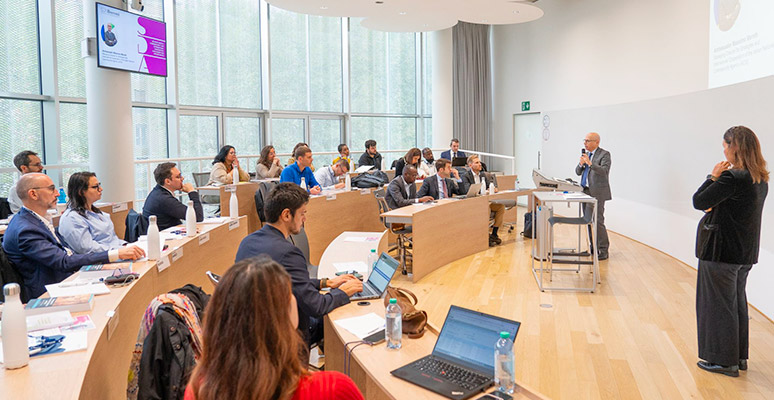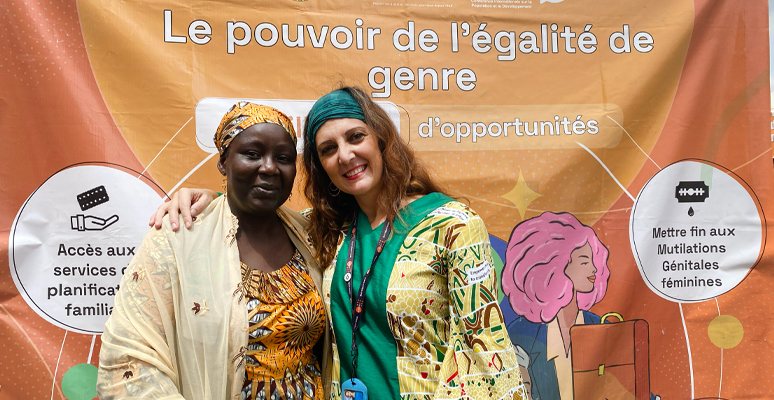
- Start date
- Duration
- Format
- Language
- 9 Apr 2025
- 3 Days
- Class
- Italian
Valutare le opportunità di finanziamento di fonte europea a sostegno dei propri progetti di investimento, ricerca e innovazione, e gestire al meglio i fondi ottenuti.
Cutting-edge management practices for a new generation of public administrators – this could be a perfect summary of #NextGenerationPA, the five-day EMMAP - Executive Master in Management delle Amministrazioni Pubbliche module devoted to directly interacting with managers from domestic and international institutions, private and public. This year’s are top speakers working at large and successful government projects. A milestone for EMMAP participants to understand how to substantiate the key points in the debate about the role and future of the public administration – innovation, sustainability, leadership, managing complexity, just to mention a few.
The five days, designed and directed by EMMAP faculty members Alexander M. Hiedemann and Veronica Vecchi, addressed these topics by moving about within communities, physically travelling too, and tapping into the personal experience of those who have been in charge of some really innovative projects, in terms of both process and results. After Carlo Altomonte and Carlo Viviani – members of the Italian task force to establish the PNRR and of the Europen Commission’s Recovery and Resilience Task Force, respectively – and BEI’s Guido Bichisao, among others, envisaged the public administration in general in a European perspective, the module addressed the management of complexity through network governance, with Bologna Municipality’s Manuela Marsano describing the creation of a reception shelter for migrants strongly engaging the surrounding area, and Protezione Civile’s Francesco Campopiano presenting the better known case of Costa Concordia’s shipwreck removal.
The third day dealt with the topics of sustainability and performance, especially focusing on ESG (Environment, Social, Governance) and SDGs (the 17 objectives defined by the 2030 Sustainable Development Agenda), comparing the public and private points of view thanks to managers from international networks, such as SDG Lab’s Nadia Isler and Global Infrastructure Hub’s Monica Bennet, and private companies (Tim’s Claudio Pellegrini and A2A’s Giorgia Girosante).
The day dedicated to “public works: leadership and project management as drivers of results” was especially interesting. EMMAP participants traveled to Genoa and met major actors in the rebuilding of the San Giorgio bridge: the city’s Mayor Marco Bucci, Pasquale Criscuolo, Secretary and Director general of the Municipality, Maurizio Michelini, President of the Association of Engineers (in Genoa), Piero Carlo Floreani, member of the Corte dei Conti, and Ugo Ballerini, sub-Commissioner for the reconstruction, as well as Nicola Meistro, CEO of PerGenova, the consortium company in charge of designing and building the Polcevera viaduct. Both for results and timing, the rebuilding of former Morandi bridge is a clear instance of success in managing complex projects through public-private cooperation, a new strategic approach to public contract regulation and shared responsibility overcoming “fear of signing”.
“All #NextGenerationPA speakers combine strong technical expertise with excellent managerial vision and skills, within public administrations and companies,” underlines EMMAP Director Silvia Rota. “This makes it possible to look beyond the boundaries of individual institutions and their specific competences, to think in terms of networks – inter-institutional networks, PA-companies and PA-third sector networks – to achieve the best result in the most effective way.” And she continues: “This initiative concludes an especially complicated year as a consequence of the pandemic, and we wanted it to be our way of acknowledging the great work many sectors of the public administration have been doing, despite everything.”
An extremely positive feedback also came from EMMAP participants, whose synthesis of the work done during the five days highlighted, among other things, the management of complexity thanks to 3 “COs” – co-design, co-construction, co-participation –, the development of a vision aimed at reading the context with a new perspective and anticipating needs, the focus on the values of public leadership – trust and credibility – and “citizens in the center”, the real “shareholders” of public institutions who – in the words of mayor Bucci – expect a substantial outcome having a real and positive impact on their lives, more than the formal result of a procedure.
SDA Bocconi School of Management.

Valutare le opportunità di finanziamento di fonte europea a sostegno dei propri progetti di investimento, ricerca e innovazione, e gestire al meglio i fondi ottenuti.

Acquire the knowledge and key tools needed to be an effective leader in the public administration.

Il corso punta a potenziare le competenze manageriali e definire le logiche e gli strumenti fondamentali a supporto del cambiamento “agile” dei modelli organizzativi.


